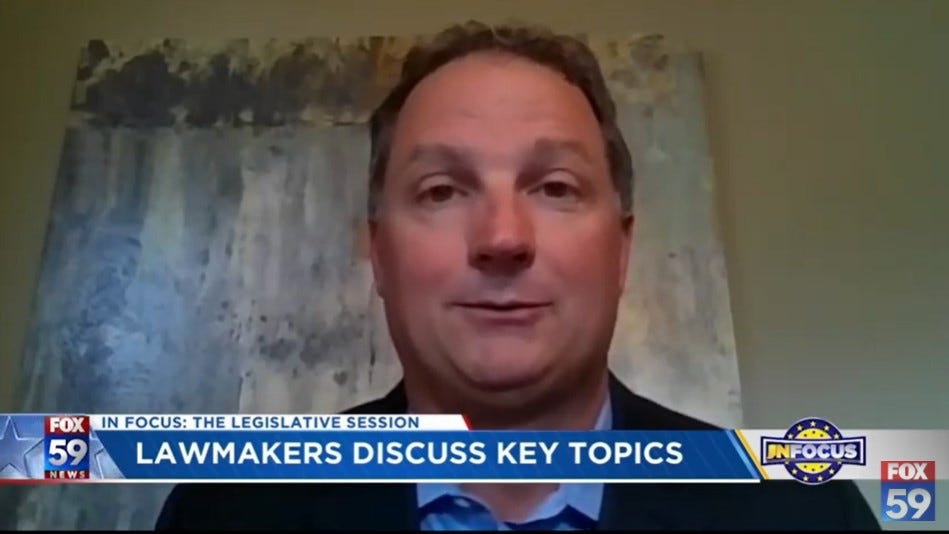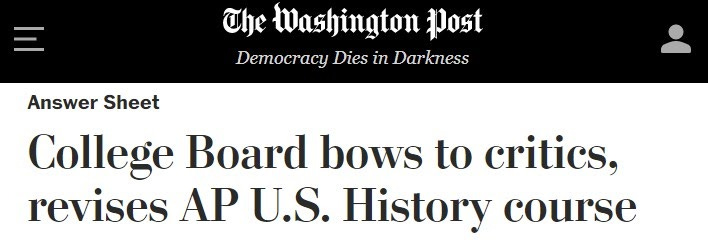Top College Board executive advocates limiting instruction of race and history in classrooms
In March 2020, as the pandemic took hold of the United States, I decided to take down Popular Information's paywall. For the last 23 months, every edition of Popular Information has been available for free. I made that decision for a couple of reasons:
Two years later, we’re still reporting on the treatment of frontline workers. And no one knows when this pandemic will end. But I'm hoping to be able to keep this newsletter free for as long as possible. Subscriptions, however, are Popular Information's only source of revenue. So here is the deal: For every 20 people that sign up for a paid subscription today, I will keep the paywall down for everyone for another month. Your support will help keep Popular Information's groundbreaking accountability journalism accessible to everyone and maximize its impact. If the cost of this newsletter ($6/month or $50/year) would create any kind of financial strain, I hope you stay on this free list. But, if you can afford it, please consider becoming a paid subscriber. A top executive for the College Board is playing a central role in advancing legislation to "limit what teachers can say regarding race, history, and politics in Indiana classrooms." The executive, Todd Huston, is paid $460,738 to serve as the College Board's Senior Vice President for State and District Partnerships, according to the organization's latest tax filing. The College Board, which designs the SAT and Advanced Placement courses, has an enormous influence on what is taught in high schools across the country. Huston also has a side hustle: Speaker of the Indiana House of Representatives. In his role as Speaker, Huston has prioritized controversial legislation to restrict instruction in Indiana classrooms. The bill, HB 1134, would prohibit any classroom materials or instruction that support a list of poorly-defined "divisive topics." Among other things, the bill would prohibit any content that suggests "any individual should feel discomfort, guilt, anguish, responsibility, or any other form of psychological distress on account of the individual's sex, race, ethnicity, religion, color, national origin, or political affiliation." A companion bill to HB 1134 was pulled from consideration in the Indiana Senate when its author, State Senator Scott Baldwin (R) said it would require high school history teachers to be "impartial" when discussing Nazism. Identical language remains in the House legislation. The legislation allows parents to school schools that violate its provisions; a teacher that runs afoul of the new constraints could lose their license. After the Senate pulled its version, Huston pushed forward and held a vote on the legislation on January 26. HB 1134 passed 60-37 on a largely party-line vote. (Nine Republicans opposed the legislation.) Huston voted in favor, over the opposition of Indiana teachers and civil rights groups. "This bill seeks to pretend that the atrocities of the past have not taken place," Ivan Hicks, Vice President of the Indianapolis NAACP, said. "We need to ensure that our children are in an environment where they have an opportunity to understand the atrocities of the past and the horrors of slavery — not simply the greatness of America." The Indiana bill, and similar legislation in other states, would also significantly impact what could be covered in high school Advanced Placement (AP) courses, which are shaped by the College Board. If Indiana's bill became law, how could an AP Literature course include works by James Baldwin, which include candid discussions of race and societal responsibility? How could an AP U.S. History course include "The Case for Reparations," which argues that Black people should be compensated for historical discrimination by whites? "Indiana's HB 1134 includes provisions that would restrict what AP teachers and other high school teachers can teach in the classroom," Jonathan Friedman, Director of Free Expression and Education at PEN America, told Popular Information. "It has vague language that has become a hallmark of educational gag orders around the country, broad prohibitions on how teachers can teach a range of subjects or include certain concepts related to racism or bias in even supplemental materials. It seems pretty clear that the bill directly implicates the work of the College Board; the fundamental work of teaching, especially topics like history and literature." Hundreds of thousands of students take AP courses each year that culminate in tests administered by the College Board. Does the College Board support Huston's efforts to limit the nature of the topics that can be discussed in these classes? Does the College Board support the broader efforts to limit curriculum about race and history across the nation? What does employing Huston as its top liaison to schools say about the College Board's mission and values? The College Board did not respond to Popular Information's request for comment. The College Board's history of catering to the right-wing on raceIn 2014, The College Board announced a revised framework for its AP U.S. History course. The purpose of the revision was to encourage students to "think more critically about America’s past." Rather than simply "quizzing students on presidential trivia and the heroic exploits of our founding fathers," students would learn, for example, "how racism was a foundational ideology of the early colonists and that immigrants have long been exploited for their labor." The right-wing freaked out. The Republican National Committee (RNC) introduced a resolution condemning the new framework, stating that it "reflects a radically revisionist view of American history that emphasizes negative aspects of our nation’s history while omitting or minimizing positive aspects." The RNC also called on Congress to "withhold any federal funding to the College Board…until the [AP U.S. History] course and examination have been rewritten in a transparent manner to accurately reflect U. S. history without a political bias." Glenn Beck sounded the alarm. Ben Carson, the former Trump administration cabinet member who was running for President at the time, warned that students who complete the revised AP U.S. History course would be "ready to go sign up for Isis.” These heavy-handed tactics worked. Despite working on the revised framework for 8 years, the College Board capitulated to critics and rewrote the framework: The College Board said it rewrote the framework in response to "principled feedback" and the new version was "clearer and more balanced." It includes "a section on 'American exceptionalism' after significant backlash from culture conservatives who said the exam wasn’t patriotic enough." Today, history is repeating itself. Right-wing politicians are once again objecting to candid discussions of race in classrooms. But this time, those objections are not just being accepted and accommodated by the College Board. A top College Board executive is leading the charge. The College Board's diversity problemThe College Board recognizes it has a problem with diversity. Specifically "African American, Latino, and Native American students" are underrepresented in AP courses. Since AP courses are a key factor in admission to selective colleges, the failure to enroll more of these students perpetuates inequality in higher education. Critically, the College Board recognizes that this is not a matter of Black or Latino students being unprepared for AP coursework. And it is not only an issue of these students attending a high school where AP courses are not offered. Rather, thousands of these students are prepared but are not enrolling:
The College Board says "we can—and must—do something to move the needle now and eliminate barriers for students with potential." One way to make these classes more appealing to qualified students of color is to include more diverse content. But the bill championed by Huston will only make it more difficult to candidly discuss racial history or assign acclaimed novels from diverse writers. The College Board's silence about these bills, and Huston's role, raises questions about whether it is truly committed to making AP courses more representative of the nation as a whole. |
Older messages
What we learned from the first FEC deadline of 2022
Thursday, February 3, 2022
This week brought the first FEC deadline of the year — and it was a doozy. Nearly every committee and campaign were required to file. Popular Information sorted through that mountain of data and came
Corporations send large donations to GOP group behind abortion bans and voter suppression
Wednesday, February 2, 2022
In 2021, Republican-controlled state legislatures imposed a bevy of radical policies on millions of Americans. This was especially pronounced in two areas: abortion and voting rights. According to the
How a new proposal to stop Trump from stealing the 2024 election could backfire
Tuesday, February 1, 2022
Donald Trump is acting like someone who is running for president, holding political rallies around the country. If Trump runs, he would be the favorite to win the Republican nomination. Yes, Trump
North Carolina superintendent abruptly removes MLK-themed novel from 10th grade class
Monday, January 31, 2022
An acclaimed MLK-themed novel was removed from a 10th-grade English class in North Carolina. Haywood County Superintendent Dr. Bill Nolte told Popular Information that he pulled the book, Dear Martin
A strange meeting at the White House
Thursday, January 27, 2022
On Wednesday, according to the official White House schedule, President Biden met "with private sector CEOs to discuss the ways his Build Back Better [(BBB)] agenda will grow the economy and make
You Might Also Like
Instacart joins Uber in lawsuit against Seattle
Thursday, December 26, 2024
PSL spinout brings AI to compliance management | Doctor-led startup gets FDA approval ADVERTISEMENT GeekWire SPONSOR MESSAGE: GeekWire's special series marks Microsoft's 50th anniversary by
A pleasure and a privilege.
Thursday, December 26, 2024
Less than 25¢ a day to hold the powerful accountable.
☕ Not worth the hype
Thursday, December 26, 2024
CMOs on 2024's most overhyped marketing trends. December 26, 2024 View Online | Sign Up Marketing Brew Presented By Salesforce It's Thursday. Move over, brat—we're playing the Vince
☕ Shortchanged
Thursday, December 26, 2024
This year's shorter holiday season. December 26, 2024 View Online | Sign Up Retail Brew It's Thursday—Boxing Day if you live pretty much anywhere but the US. We're celebrating by kicking
Hit Games
Thursday, December 26, 2024
Hashtags And Hit Lists // Let The Games Begin Hit Games By Kaamya Sharma • 26 Dec 2024 View in browser View in browser Hashtags And Hit Lists Colin Wright | Reality's Last Stand | 23rd December
Tumultuous year in politics – readers and editors pick favorite stories
Thursday, December 26, 2024
A year of explaining the 'why' and 'how' behind politics headlines
🍿 ‘Squid Game’s Sophomore Slump
Thursday, December 26, 2024
Plus: 'Doctor Who' showrunner Russell T Davies and 2024 Christmas special writer Steven Moffat chat about doing one more episode together. Inverse Daily Netflix's surprise hit comes back
Our Favorite Beauty Stories of 2024
Thursday, December 26, 2024
Basting with zinc butt cream got a lot of votes. The Strategist Beauty Brief December 26, 2024 Every product is independently selected by editors. If you buy something through our links, New York may
The Human Face Of The Corporate Takeover
Thursday, December 26, 2024
While The Lever team is on holiday break, here's a selection of our best reporting this year. Art from The Lever's human-interest investigations. (Clockwise from top left: Ryan Johnson/Lindsey
Greetings from The Flyover
Thursday, December 26, 2024
͏ ͏ ͏ ͏ ͏ ͏ ͏ ͏ ͏ ͏ ͏ ͏ ͏ ͏ ͏ ͏ ͏ ͏ ͏ ͏ ͏ ͏ ͏ ͏ ͏ ͏ ͏ ͏ ͏ ͏ ͏ ͏ ͏ ͏ ͏ ͏ ͏ ͏ ͏ ͏ ͏ ͏ ͏ ͏ ͏ ͏ ͏ ͏ ͏ ͏



